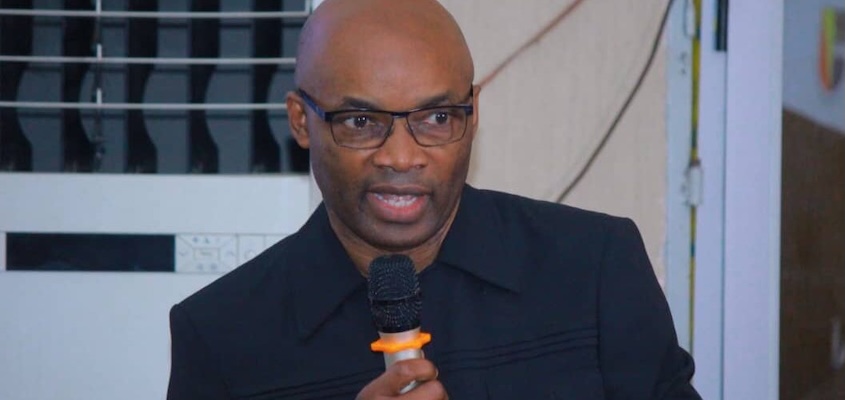French Court Convicts French-Cameroonian Journalist Charles Onana for Speech Crime
TRANSCEND MEMBERS, 16 Dec 2024
Ann Garrison | Black Agenda Report – TRANSCEND Media Service
11 Dec 2024 – A French criminal court has convicted a journalist for writing dissident history about Rwanda and the Democratic Republic of the Congo.
On December 9, a French court convicted French Cameroonian scholar, journalist, and historian Charles Onana of “denying crimes against humanity” in his book Rwanda, la vérité sur l’opération Turquoise: Quand les archives parlent (Rwanda, the Truth of Operation Turquoise: When the Archives Speak), published in 2023.
Onana is the author of many other books, more than not concerning the Rwandan and Congolese tragedies that began when the Rwandan Patriotic Front led by General Paul Kagame invaded Rwanda in October 1990. Only one, Holocaust in Congo: The Omerta of the International Community (2023), has been translated from French to English . Omertà is an Italian word referring to a code of silence and honor, like that in Mafia culture, which isn’t easily translated.
The French titles include Les secrets du genocide rwandais (Secrets of the Rwandan Genocide), Ces Tuers Tutsi au coeur de la tragédie congolaise (These Tutsi Killers at the Heart of the Congolese Tragedy), and Enquêtes sur un attentat–Rwanda 6 avril 1994 (Investigations into an Attack–Rwanda April 6, 1994).
Onana has been fined 8,400 euros and his publisher has been fined 5,000 euros. (One euro currently equals roughly $1.05.) They must also pay 11,000 euros in damages to the human rights NGOs that filed the lawsuit. Fines and damages will all be refunded if the decision is reversed on appeal. It’s a dark day for free speech, but Onana and his publisher have announced that they will appeal.
Should history be codified and enforced?
Onana’s case is important for free speech rights in France and beyond. Should history be legally codified and enforced? Should dissenters be prosecuted? Who is to decide what is true and what is not?
These questions have also been raised in the “fake news, misinformation, and disinformation” debates that arose during Donald Trump’s first term and throughout the COVID pandemic. Should truth be official?
As George Orwell wrote in 1984, “He who controls the past controls the future.” Prevailing historical records and narratives shape people’s understanding of the present, influence their future actions, and empower authority.
Since seizing power in 1994, Rwandan President Paul Kagame and the Tutsi elite at the top of his totalitarian regime have kept a tight lock on the history of the Rwandan genocide. They have largely succeeded in relabeling it “genocide against the Tutsi” in order to retrench themselves in power. It’s a simple story, devoid of historical context, in which Rwanda’s demon Hutu majority conspired to commit genocide against its innocent Tutsi minority and the Hutus who tried to protect them.
It’s the story told in Hotel Rwanda, a movie seen by millions of people the world round, which now goes all but unchallenged except by diligent scholars and journalists, including Onana and others whose books I’ve reviewed in Black Agenda Report. They have evidenced the massacre of hundreds of thousands of Hutus by Kagame’s predominantly Tutsi army, in both Rwanda and Congo, as have UN reports.
Prosecutors at the politically agendized International Criminal Tribunal on Rwanda never indicted a single Tutsi, but they were also unable to prove a Hutu conspiracy to commit genocide. Onana has never denied that there was a Tutsi genocide, but he has called the alleged Hutu conspiracy “one of the biggest scams of the 20th century.”
Nevertheless, the simple story prevails, providing cover to Rwandan President Paul Kagame and his regime.
That regime is forever protecting its foundational narrative, the simple story, which makes its leader, Paul Kagame, the savior who ended the genocide and lifted Rwanda from the ashes. He and his minions, including compliant French NGOs, are behind the Onana prosecution.
Rwanda in two more courts
So, how does the Rwandan regime wield the power entrenched by the simple story? Some answers can be found in two more court cases underway, one in Rwanda and one at the African Court on Human and Peoples’ Rights in Arusha, Tanzania.
In Rwanda, eight opponents of the current government are now on trial after three years of pretrial detention. They are accused of planning and attending a training session on nonviolent action, based on the book Blueprint for Revolution: How to Use Rice Pudding, Lego Men, and Other Nonviolent Techniques to Galvanize Communities, Overthrow Dictators, or Simply Change the World.
One journalist, Théoneste Nsengimana, is on trial for planning to cover their protests and for “joining a criminal organization and spreading rumors.” Once again, who, if anyone, should be empowered to codify and enforce truth, to distinguish truth from rumor? Is there any type of organization that a despotic regime cannot declare “criminal” for opposing it?
Amnesty International writes:
The opposition members are facing serious charges, including forming or joining a criminal association, conspiracy to commit an offence against the ruling power of the President of the Republic, conspiracy to cause uprisings and unrest among the population, conspiracy to attack the force of the law, and conspiracy to organize unlawful demonstrations or public meetings. One DALFA-Umurinzi member has also been charged with spreading false information or harmful propaganda aimed at provoking hostile international opinion against the Rwandan Government, as well as publishing rumors.
In other words, they’re charged with speech crime and nonviolent opposition to the regime.
In July 1994, Kagame “won” re-election with a thoroughly implausible 99% of the vote.
DRC takes Rwanda to the African Court on Human and Peoples’ Rights
The Democratic Republic of the Congo (DRC) has launched a case against Rwanda at the African Court on Human and Peoples’ Rights (AfCHPR) in Arusha, Tanzania, that will begin in February 2025.
DRC alleges that Rwanda is behind the March 23rd Movement (M23), a militia that has been attacking the people of Congo’s North Kivu Provinces and looting their resources since 2012. M23 is the latest iteration of the Rwandan militia that have occupied DRC since Rwanda and Uganda invaded and overthrew first Mobutu Sese Seko, then Laurent Desiré Kabila in the 1990s.
Rwanda’s crimes in Congo have been thoroughly documented in the UN’s 1999 Garreton Report , the annual UN Group of Experts Reports , and the UN’s 2010 report, DRC: Mapping Human Rights Violations 1993-2003 , but no court has yet ruled that Rwanda must answer for them. DRC has also taken Rwanda to the East African Court of Justice , also in Arusha, but that court is still deliberating.
Rwanda submitted its withdrawal from the AfCHPR’s jurisdiction in 2016 to avoid conviction in the case brought by Rwandan political prisoner Victoire Ingabire. Rwanda did not submit its withdrawal in time to be legally binding, and the court ruled that it had violated Ingabire’s right to freedom of expression and a fair trial by imprisoning her based on her political statements, which did not threaten national security. The court also ruled that Rwanda had infringed on her fundamental rights under the African Charter on Human and Peoples’ Rights and the International Covenant on Civil and Political Rights .
In its statement withdrawing from the court, Rwanda repeated its perpetual excuse for domestic repression and crimes in Congo—that “the 1994 genocide against the Tutsi was the most heinous crime since the Holocaust” and that they should therefore never be called to task for any crimes of their own.
The AfCHPR has agreed to hear DRC’s case even though Rwanda no longer accepts its jurisdiction, and it’s hard to imagine that the court will not rule in DRC’s favor, given decades of abundant evidence.
Will such a ruling stop Rwanda in the Congo? No, of course not. The court’s judgment in favor of Victoire Ingabire did not free her, and Rwanda never paid her reparations that the court ordered. The AfCHPR has no army and no enforcement mechanism. Unlike the International Criminal Court, it has no authority to issue arrest warrants. The best that can be expected is a moral victory, but that may give Kagame less room to move, as has the diligent research of Charles Onana and so many others.
Both Onana and the African court deserve whatever support we can offer.
_______________________________________________
 Ann Garrison is an independent journalist based in the San Francisco Bay Area. She attended Stanford University and is a member of the TRANSCEND Network for Peace Development Environment. In 2014 she received the Victoire Ingabire Umuhoza Democracy and Peace Prize for her reporting on conflict in the African Great Lakes region. She can be reached at ann@anngarrison.com
Ann Garrison is an independent journalist based in the San Francisco Bay Area. She attended Stanford University and is a member of the TRANSCEND Network for Peace Development Environment. In 2014 she received the Victoire Ingabire Umuhoza Democracy and Peace Prize for her reporting on conflict in the African Great Lakes region. She can be reached at ann@anngarrison.com
Go to Original – blackagendareport.com
Tags: Africa, D.R. Congo, France, Genocide, Journalism, Justice, Media, Rwanda
DISCLAIMER: The statements, views and opinions expressed in pieces republished here are solely those of the authors and do not necessarily represent those of TMS. In accordance with title 17 U.S.C. section 107, this material is distributed without profit to those who have expressed a prior interest in receiving the included information for research and educational purposes. TMS has no affiliation whatsoever with the originator of this article nor is TMS endorsed or sponsored by the originator. “GO TO ORIGINAL” links are provided as a convenience to our readers and allow for verification of authenticity. However, as originating pages are often updated by their originating host sites, the versions posted may not match the versions our readers view when clicking the “GO TO ORIGINAL” links. This site contains copyrighted material the use of which has not always been specifically authorized by the copyright owner. We are making such material available in our efforts to advance understanding of environmental, political, human rights, economic, democracy, scientific, and social justice issues, etc. We believe this constitutes a ‘fair use’ of any such copyrighted material as provided for in section 107 of the US Copyright Law. In accordance with Title 17 U.S.C. Section 107, the material on this site is distributed without profit to those who have expressed a prior interest in receiving the included information for research and educational purposes. For more information go to: http://www.law.cornell.edu/uscode/17/107.shtml. If you wish to use copyrighted material from this site for purposes of your own that go beyond ‘fair use’, you must obtain permission from the copyright owner.
Join the discussion!
We welcome debate and dissent, but personal — ad hominem — attacks (on authors, other users or any individual), abuse and defamatory language will not be tolerated. Nor will we tolerate attempts to deliberately disrupt discussions. We aim to maintain an inviting space to focus on intelligent interactions and debates.
